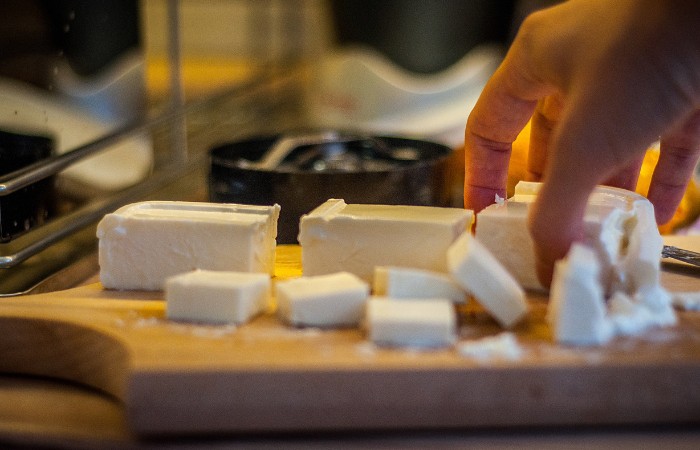Feta cheese is a popular ingredient in many Mediterranean and Middle Eastern dishes. Its crumbly texture and tangy taste make it a favorite among cheese lovers. However, like all types of cheese, feta cheese can go bad, leading to potential health risks for those who consume it.

In this blog post, we will explore the signs of bad feta cheese, what happens when you eat it, and how to prevent consuming it. We will also answer some frequently asked questions about it. Whether you’re a feta cheese lover or just want to learn more about it, this post will provide valuable insights to help you make informed decisions about its consumption.
How Can You Tell if Feta Cheese Has Gone Bad?
There are a few signs to look out for that can indicate if feta cheese has gone bad:
Smell
Feta cheese should have a slightly tangy and salty aroma. If it smells sour, rancid, or has a strong ammonia-like odor, it may have gone bad.
Appearance
Feta cheese should have a consistent creamy white color. If you notice any discoloration, such as yellow or brown spots, or if the cheese appears slimy, it may be a sign that it has gone bad.
Texture
Feta cheese should be crumbly and moist, but not excessively wet or runny. If the texture is overly soft or mushy, it may be a sign that it has spoiled.

Taste
Feta cheese should have a slightly tangy and salty flavor. If it tastes sour or bitter, it may have gone bad.
If you observe any of these signs, it’s best to discard the cheese to avoid the risk of food poisoning. It’s important to follow proper food safety guidelines when handling and storing feta cheese to ensure its freshness and safety for consumption.
What Happens when You Eat Bad Feta Cheese?
Consuming bad feta cheese can lead to food poisoning. This is because bad feta cheese contains harmful bacteria, such as Listeria, Salmonella, or E.coli, which can cause a variety of symptoms.
The symptoms of food poisoning from bad feta cheese can range from mild to severe and can include:
- Nausea and vomiting
- Diarrhea
- Stomach cramps and pain
- Fever
- Headache
- Fatigue
In severe cases, food poisoning from bad feta cheese can lead to dehydration, organ damage, or even death. Certain individuals, such as pregnant women, young children, and people with weakened immune systems, are at higher risk of developing serious complications from consuming bad feta cheese.
It’s crucial to seek medical attention if you experience any severe symptoms after consuming bad feta cheese. It’s also important to prevent consuming bad feta cheese by following proper storage guidelines and checking for signs of spoilage before consuming it.
How to Prevent Eating Bad Feta Cheese
There are several measures you can take to prevent eating bad feta cheese and minimize your risk of developing food poisoning. Here are some tips to keep in mind:
Storage Tips
Proper storage is key to keeping feta cheese fresh and safe for consumption. Store feta cheese in an airtight container in the refrigerator, away from other foods that may transfer their odors or flavors. You can also store feta cheese in brine to help preserve it for longer.
Shelf Life of Feta Cheese
Feta cheese has a relatively short shelf life and can only last for a few weeks in the refrigerator. Be sure to check the expiry date on the packaging and consume the cheese before it goes bad.

Label Reading
When purchasing feta cheese, be sure to read the label carefully to ensure it’s made with pasteurized milk. This process helps eliminate harmful bacteria that can cause food poisoning. Also, check the packaging for any signs of damage or tampering before purchasing or consuming it.
How Long Does It Take for Symptoms to Appear After Eating Bad Feta Cheese?
The time it takes for symptoms to appear after eating bad feta cheese can vary depending on a few factors, such as the amount of contaminated cheese consumed and the individual’s immune system. In general, symptoms may appear within a few hours to a few days after consuming the bad cheese. Some common symptoms of food poisoning from bad feta cheese may include nausea, vomiting, stomach cramps, diarrhea, and fever. If you experience any of these symptoms after consuming feta cheese, it’s important to seek medical attention and avoid consuming any more of the cheese.
Can You Still Use Feta Cheese that Has Gone Bad if You Cut Off the Mold?
Cutting off the mold from feta cheese that has gone bad is not a reliable method of determining whether the cheese is safe to eat. The mold on the surface of the cheese may not be the only indication that the cheese has gone bad. Harmful bacteria that are not visible to the naked eye may have also grown on the cheese, making it unsafe to eat.
In general, it’s recommended to discard feta cheese that has gone bad, rather than trying to salvage it. Consuming bad feta cheese can lead to food poisoning and other health risks, so it’s important to take food safety seriously and err on the side of caution. If in doubt, it’s best to throw out the cheese and purchase a fresh batch.
Is It Safe to Eat Feta Cheese that Has Been Left out Of the Fridge for A Few Hours?
Leaving feta cheese out of the fridge for a few hours is not necessarily a cause for concern, but it does increase the risk of bacterial growth and spoilage. Feta cheese is a perishable food item that requires refrigeration to stay fresh and safe to eat. When left out of the fridge, the temperature of the cheese can rise, creating an ideal environment for harmful bacteria to grow.
If the feta cheese has been left out of the fridge for a few hours in a cool and dry environment, it may still be safe to eat. However, it’s important to use your judgment and assess the condition of the cheese before consuming it. If the cheese appears to be discolored, slimy, or has an off smell, it’s best to discard it to avoid the risk of food poisoning.

In general, it’s recommended to store feta cheese in the refrigerator at a temperature between 34-40°F (1-4°C) to ensure its safety and freshness.
What Should You Do if You Suspect You’ve Eaten Bad Feta Cheese?
If you suspect that you have eaten bad feta cheese and are experiencing symptoms of food poisoning such as nausea, vomiting, stomach cramps, diarrhea, or fever, it’s important to seek medical attention as soon as possible.
In the meantime, you should try to stay hydrated by drinking plenty of water to replace fluids lost due to diarrhea or vomiting. You can also try consuming clear fluids such as broth, tea, or sports drinks to help replace electrolytes lost during diarrhea or vomiting.
It’s also important to avoid eating any more of the feta cheese or any other food that may have been contaminated. If possible, save a sample of the cheese to show to a doctor or public health official, as this can help with identifying the source of the contamination.








